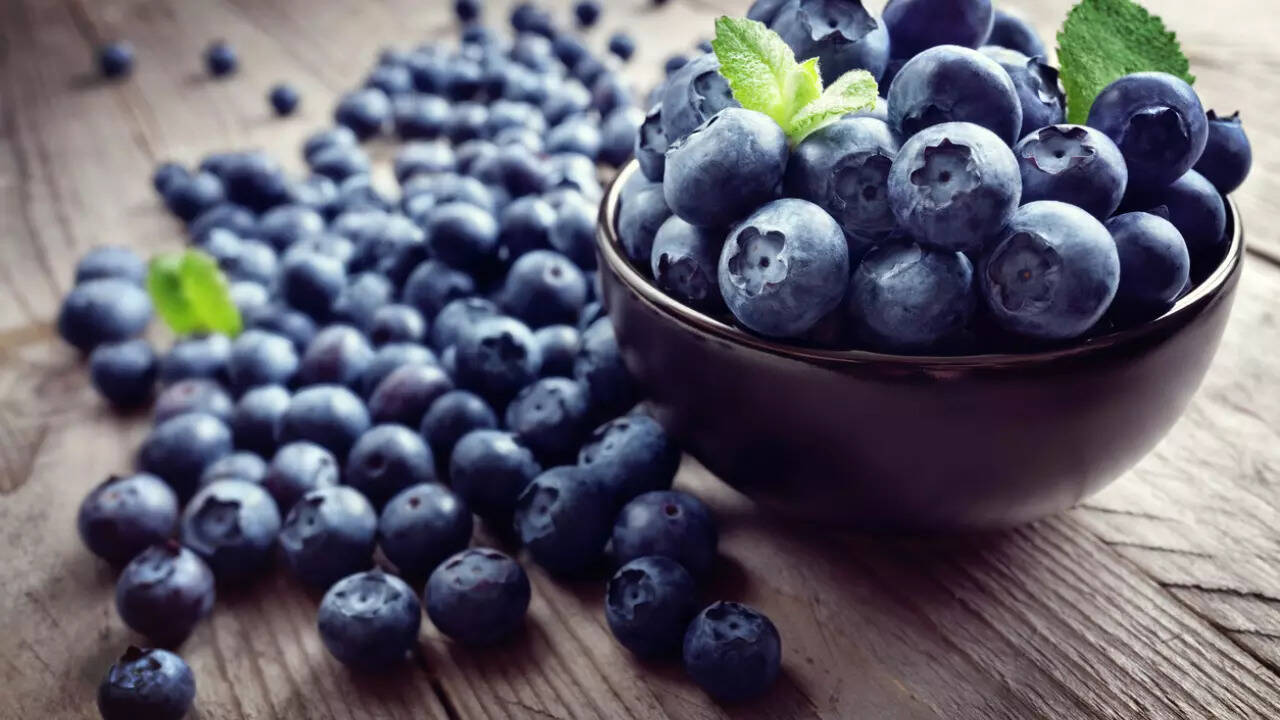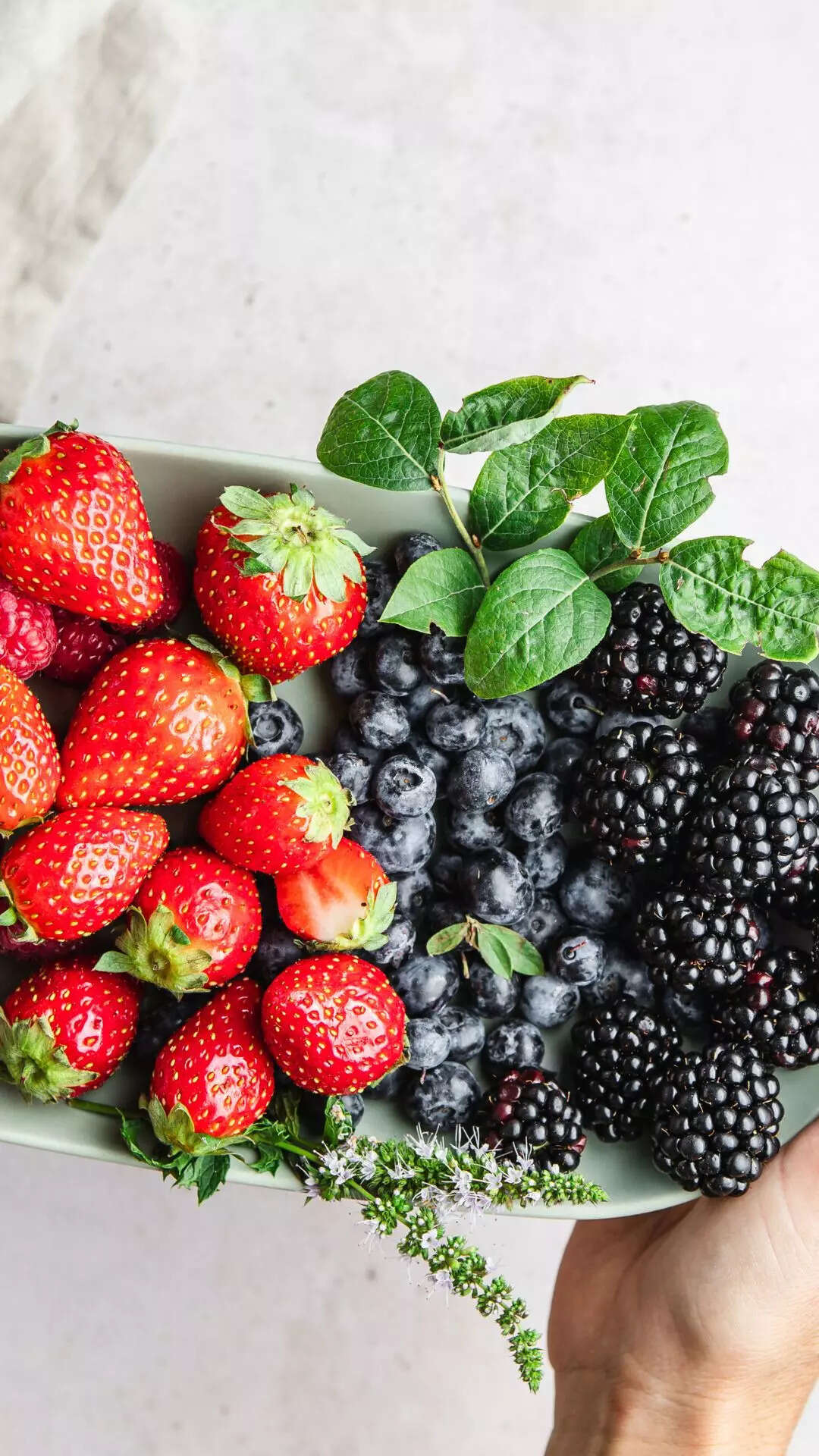In a world where we stare at screens all day and neglect our natural light cycles, our eyes are under more stress than ever but the good news is that nature often offers simple and delicious ways to help protect them. Backed by science and cherished by nutrition experts, four everyday fruits are loaded with nutrients that support sharp vision, reduce fatigue and help guard against age-related eye conditions like cataracts.
Blueberries : The antioxidant powerhouse
Blueberries may seem small but the berry’s antioxidant content packs a punch. Since oxidative stress and free radical damage are key contributors to the ageing of eye tissue (especially the lens and retina), eating antioxidant-rich foods becomes a smart move and blueberries help protect the eyes from this sort of damage.A recent 2025 laboratory study by the Journal of Agricultural and Food Chemistry, tested blueberry anthocyanin extracts and reported protective effects on retinal cells, suggesting these compounds may blunt oxidative stress in eye tissue. The paper describes molecular mechanisms by which anthocyanins protect retinal pigment epithelium cells.

Blueberries are packed with antioxidants, especially vitamin C and anthocyanins, which help fight free radicals and support collagen production, both essential for healthy, glowing skin. Their anti-inflammatory properties can also reduce redness and puffiness, while their high water content keeps the skin hydrated from within. Regularly including blueberries in your diet may help brighten your complexion, protect against premature aging, and promote an even skin tone naturally.
A 2019 review of blueberry research in Nutrition Reviews summarised how anthocyanins influence vascular health and oxidative stress that are pathways directly relevant to long-term eye health. So, add a handful of blueberries to your morning oats or yogurt (fresh or frozen works), blend into smoothies or snack on them plain for an easy antioxidant boost.
Oranges (and other vitamin C–rich fruit) for strong eye tissues
Vitamin C is not just for the immune system, it plays a vital role in eye health too. According to studies, oranges provide a rich supply of vitamin C that supports the structural integrity of eye tissues. This helps especially with preventing early clouding of the lens, one of the steps toward cataract formation. Vitamin C is concentrated in the eye lens and acts as an antioxidant. Over a lifetime, oxidative damage to lens proteins is a major driver of cataract formation but vitamin C helps slow that damage.A 2016 meta-analysis in Acta Ophthalmologica found that “higher vitamin C intake and serum ascorbate might be inversely associated with risk of cataract.” In plain terms, people who consume more vitamin C tend to have lower rates of cataract.

These 4 Fruits Are the Secret Weapon Against Age-Related Eye Damage
A 2019 dose-response analysis in Nutrition also reported that increases in vitamin C were associated with reduced cataract risk, reinforcing the benefit of regular vitamin-C rich foods. An orange a day or a citrus salad keep vitamin C intake steady. Pair vitamin C foods with healthy fats (yogurt, nuts) to improve absorption of other eye nutrients.
Papaya : The tropical fruit that helps with dry eyes and inflammation
If your eyes often feel tired, dry or itchy, it might be more than screen-time and papaya brings in nutrients that help reduce eye inflammation and combat dryness in the eyes. It is a go-to fruit when your eyes feel overworked. As per the studies, papaya supplies vitamin A precursors and other carotenoids, plus anti-inflammatory phytonutrients. Carotenoids support retinal and lens health and reduce chronic low-grade inflammation that helps preserve eye tissue over time.Analyses of papaya in a 2021 carotenoid composition study by Food Chemistry confirm it as a good source of carotenoids and show bioaccessibility varies by variety but overall papaya offers lutein/zeaxanthin precursors and antioxidants useful for eye health. The broader nutrition literature highlights papaya’s anti-inflammatory nutrients that can lower oxidative stress. So, dice papaya into breakfasts or smoothies or pair with lime and chia for a quick anti-inflammatory snack.
Kiwi : The green shield for your retina
Don’t overlook kiwi. This green fruit contains plant compounds that support retinal health, especially protective against degeneration that can affect vision clarity over time and is part of the mix for sharper, healthier vision. Kiwi is unusually high in vitamin C and contains lutein/zeaxanthin along with other antioxidants that are a neat package for both lens protection and macular health.Reviews of kiwifruit nutrition highlight its high vitamin C content and a supportive nutrient profile that can benefit eye health and general metabolic wellness. Clinical and observational evidence links dietary lutein/zeaxanthin (the carotenoids found in kiwis and leafy greens) with better macular health.So, slice a kiwi after dinner as a refreshing dessert, toss into salads or blend into green smoothies.
Why diet matters more than you think for eye health
Most of us associate vision problems with needing glasses or age catching up but behind that are physiological changes like oxidative stress, inflammation, blood-vessel damage and wear and tear on lens proteins. A diet rich in protective nutrients directly addresses these processes. According to the fruit studies, just including these fruits (with their vitamins, antioxidants and beneficial plant compounds) can make a meaningful difference in how your eyes feel and function. Also, if you are spending long hours on digital devices or living in a polluted/regional-smog context (hello big cities), or have diabetes/high blood sugar (which affects eye vessels), then the need to optimise your diet grows stronger. Make sure you pair fruit intake with other good practices for eye health. Take breaks from screens every 20 minutes (the 20-20-20 rule: look 20 feet away for 20 seconds every 20 minutes), ensure adequate lighting, control overall blood sugar and get annual eye check-ups.
The takeaway
Your eyes are not just passive observers, they reflect what is going on inside your body and while you cannot reverse all age-related eye changes, you can hit “pause” on a lot of the damage with smart diet and lifestyle moves. The four fruits above are easy, affordable, delicious and effective. So the next time you go fruit shopping, think of your eyes too. With the right choices, you might not just see clearer today but you might protect how you see years down the line.Note: The information provided in this article is for educational purposes only and is not intended as medical advice. Always consult with a healthcare professional before starting any new medication or treatment.


:max_bytes(150000):strip_icc()/TAL-home-orlando-florida-NO1RETIRECITY1025-3e73d55f03fd4dbab2c5fefe24cbe68c.jpg)
